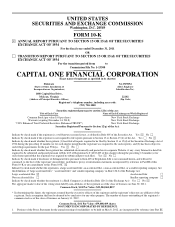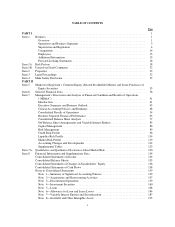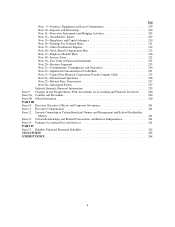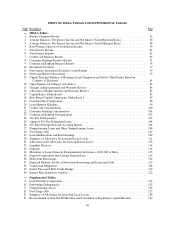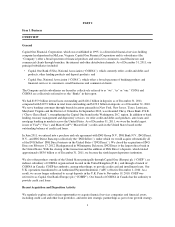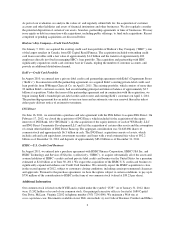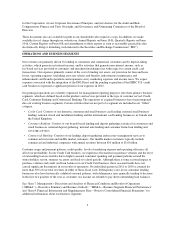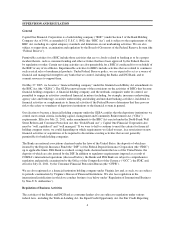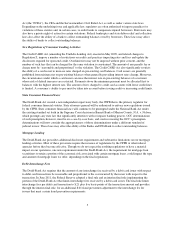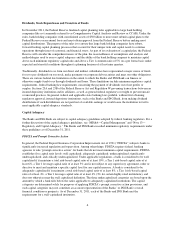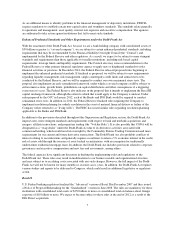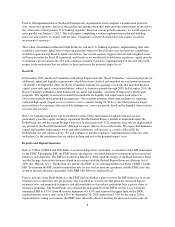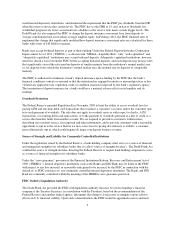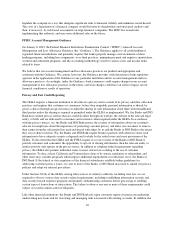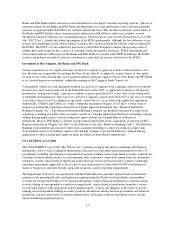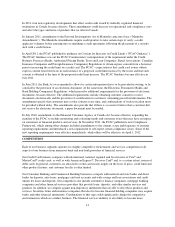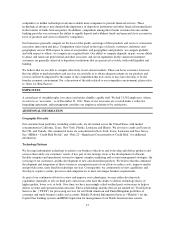Capital One 2011 Annual Report Download - page 25
Download and view the complete annual report
Please find page 25 of the 2011 Capital One annual report below. You can navigate through the pages in the report by either clicking on the pages listed below, or by using the keyword search tool below to find specific information within the annual report.Act (the “FCRA”), the CRA and the Servicemembers Civil Relief Act, as well as under various state laws.
Depending on the underlying issue and applicable law, regulators are often authorized to impose penalties for
violations of these statutes and, in certain cases, to order banks to compensate injured borrowers. Borrowers may
also have a private right of action for certain violations. Federal bankruptcy and state debtor relief and collection
laws also affect the ability of a bank to collect outstanding balances owed by borrowers. These laws may affect
the ability of banks to collect outstanding balances.
New Regulations of Consumer Lending Activities
The Credit CARD Act (amending the Truth-In-Lending Act) enacted in May 2009, and related changes to
Regulation Z, impose a number of restrictions on credit card practices impacting rates and fees and update the
disclosures required for open-end credit. Overlimit fees may not be imposed without prior consent, and the
number of such fees that can be charged for the same violation is constrained. The amount of any penalty fee or
charge must be “reasonable and proportional” to the violation. The Credit CARD Act also significantly restricts
the ability of a card issuer to increase rates charged on pre-existing card balances. Card issuers are generally
prohibited from raising rates on pre-existing balances when generally prevailing interest rates change. Moreover,
the circumstances under which a card issuer can raise the interest rate on pre-existing balances of a customer
whose risk of default increases are restricted. Payments above the minimum payment must be allocated first to
balances with the highest interest rate. The amount of fees charged to credit card accounts with lower credit lines
is limited. A consumer’s ability to pay must be taken into account before issuing credit or increasing credit limits.
State Consumer Financial Laws
The Dodd-Frank Act created a new independent supervisory body, the CFPB that is the primary regulator for
federal consumer financial statutes. State attorneys general will be authorized to enforce new regulations issued
by the CFPB. State consumer financial laws will continue to be preempted under the National Bank Act under
the existing standard set forth in the Supreme Court decision in Barnett Bank of Marion County, N.A. v. Nelson,
which preempts any state law that significantly interferes with or impairs banking powers. OCC determinations
of such preemption, however, must be on a case-by-case basis, and courts reviewing the OCC’s preemption
determinations will now consider the appropriateness of those determinations under a different standard of
judicial review. These laws may affect the ability of the Banks and ING Bank to collect outstanding balances.
Mortgage Lending
The Dodd-Frank Act prescribes additional disclosure requirements and substantive limitations on our mortgage
lending activities. Most of these provisions require the issuance of regulations by the CFPB or other federal
agencies before they become effective. Though we do not expect the resulting regulations to have a material
impact on our operations, one new requirement under the Dodd-Frank Act, the requirement for mortgage loan
securitizers to retain a portion of the economic risk associated with certain mortgage loans, could impact the type
and amount of mortgage loans we offer, depending on the final regulations.
Debit Interchange Fees
The Dodd-Frank Act requires that the amount of any interchange fee received by a debit card issuer with respect
to debit card transactions be reasonable and proportional to the cost incurred by the issuer with respect to the
transaction. In June 2011, the Federal Reserve adopted a final rule and an interim final rule implementing the
portion of the Dodd-Frank Act that limits interchange fees received by a debit card issuer. The final rule limits
interchange fees per debit card transaction to $.21 plus five basis points of the transaction amount and provides,
through the interim final rule, for an additional $.01 fraud prevention adjustment to the interchange fee for
issuers that meet certain fraud prevention requirements.
5




